An electric water heater uses electricity to heat water for domestic use. It’s efficient, reliable, and easy to install.
Electric water heaters offer a convenient way to ensure a steady supply of hot water. These appliances are designed to be energy-efficient and are suitable for both small and large households. They typically come with adjustable thermostats, allowing users to set their preferred water temperature.
Modern electric water heaters also feature safety mechanisms, such as automatic shut-off and overheating protection. Maintenance is minimal, primarily involving periodic cleaning and checking for any potential issues. Investing in an electric water heater can lead to significant savings on energy bills while providing the comfort of hot water on demand.
Introduction To Electric Water Heaters
Electric water heaters are a popular choice for many households. They provide hot water efficiently and reliably. Understanding their benefits and components can help you make an informed decision.
Importance Of Energy Efficiency
Energy efficiency is crucial for saving money and protecting the environment. An energy-efficient water heater uses less power. This means lower electricity bills and reduced carbon footprint.
Look for heaters with an Energy Star rating. These models meet strict energy efficiency guidelines. They can save you hundreds of dollars over their lifespan.
Basic Components
Electric water heaters have several key components. Here are the main parts:
- Heating Elements: These are the parts that heat the water. Most heaters have two elements.
- Thermostat: This controls the temperature of the water. You can set it to your desired level.
- Tank: This is where the water is stored. Tanks come in different sizes to fit your needs.
- Dip Tube: This tube allows cold water to enter the tank. It ensures water is heated evenly.
- Pressure Relief Valve: This safety feature releases excess pressure. It prevents the tank from bursting.
Understanding these components helps in maintenance and troubleshooting. Regular checks can extend the life of your water heater.
| Component | Function |
|---|---|
| Heating Elements | Heat the water inside the tank |
| Thermostat | Controls the water temperature |
| Tank | Stores the heated water |
| Dip Tube | Allows cold water to enter the tank |
| Pressure Relief Valve | Releases excess pressure |
Regular maintenance ensures all these parts work efficiently. This helps in keeping your water heater in top condition.
Types Of Electric Water Heaters
Electric water heaters come in various types. Each type has its own benefits. Choosing the right one depends on your needs.
Tankless Models
Tankless water heaters are also called on-demand water heaters. They heat water only when you need it. This can save energy. They are small and can be mounted on a wall.
Here are some key features of tankless models:
- Energy-efficient
- Compact size
- Longer lifespan
- Unlimited hot water
Tankless models are ideal for small homes. They are also great for apartments.
Storage Tank Models
Storage tank water heaters are the most common type. They have a large tank to store hot water. They keep the water hot all day long.
Here are some key features of storage tank models:
- Low initial cost
- Easy installation
- Variety of sizes
- Reliable hot water supply
Storage tank models are suitable for larger families. They are also good for homes with high water usage.
| Feature | Tankless Models | Storage Tank Models |
|---|---|---|
| Energy Efficiency | High | Moderate |
| Size | Compact | Large |
| Initial Cost | High | Low |
| Lifespan | Long | Medium |
| Hot Water Supply | Unlimited | Limited to tank size |
Energy Efficiency Ratings
Electric water heaters are popular for their ease of use. Understanding their energy efficiency ratings can save you money. It also helps in reducing your environmental footprint. Let’s dive into the key aspects of these ratings.
Understanding Energy Factor (ef)
The Energy Factor (EF) measures a water heater’s efficiency. It indicates how well the heater converts energy into hot water. A higher EF means better efficiency.
Here are the factors EF considers:
- Recovery efficiency: How fast the water is heated.
- Standby losses: The heat lost from the heater’s tank.
- Cycling losses: The loss of heat during the water’s circulation.
Most electric water heaters have EF ratings between 0.7 and 0.95. Aim for a higher EF rating for better energy savings.
Interpreting Energy Guide Labels
The Energy Guide Label provides essential information about the heater’s energy use. It helps you compare different models easily.
Here is a breakdown of what the label includes:
| Section | Information Provided |
|---|---|
| Estimated Yearly Energy Cost | The estimated annual cost to run the heater. |
| Energy Use | The amount of energy the heater uses in a year. |
| Comparison Bar | Shows how the model compares to others. |
Look for models with lower estimated yearly energy costs. These models are more efficient and cost-effective.

Credit: www.lowes.com
Installation Considerations
Installing an electric water heater can be straightforward. Proper planning ensures efficiency and safety. Here are key factors to consider.
Location And Space
Choosing the right location for your electric water heater is crucial. It should be easily accessible for maintenance. Ensure the area is dry and well-ventilated. The water heater needs enough space around it for proper airflow.
Measure the space where you plan to install the heater. Check the dimensions of the heater against your space. Leave at least 12 inches of clearance around the heater.
Consider the proximity to the bathrooms and kitchen. This reduces heat loss and improves energy efficiency. Ensure the location is close to electrical outlets.
| Criteria | Details |
|---|---|
| Accessibility | Easy access for maintenance and repair |
| Ventilation | Dry and well-ventilated space |
| Clearance | At least 12 inches of space around |
| Proximity | Close to bathrooms and kitchen |
Professional Vs. Diy Installation
Deciding between professional and DIY installation depends on your skills. A professional installation ensures safety and compliance with codes. They have the tools and experience needed.
DIY installation might save money but comes with risks. You need to understand electrical and plumbing systems. Mistakes can lead to costly repairs and safety hazards.
Here are some pros and cons:
- Professional Installation:
- Ensures safety and compliance
- Quick and efficient
- Warranty and insurance coverage
- DIY Installation:
- Cost-saving
- Learning opportunity
- Potential risks and errors
Consider your expertise before deciding. Safety should always come first.
Maintenance Tips
Keeping your electric water heater in top shape ensures efficient operation. It also extends its lifespan. This guide provides essential maintenance tips.
Regular Cleaning
Regular cleaning helps remove sediments from the tank. Sediments can cause the heater to work harder. This leads to higher energy bills.
| Steps | Description |
|---|---|
| 1. Turn Off the Power | Switch off the electric supply before cleaning. |
| 2. Drain the Tank | Attach a hose to the drain valve and empty the tank. |
| 3. Clean the Interior | Use a soft brush to scrub the inside of the tank. |
| 4. Refill the Tank | Close the drain valve and fill the tank with water. |
| 5. Restore Power | Turn the power back on after refilling. |
Checking For Leaks
Leaks can lead to water damage and increased utility bills. Regular checks are essential.
- Inspect the Tank: Look for any signs of rust or corrosion.
- Check the Pipes: Ensure all connections are tight and secure.
- Examine the Valves: Test the pressure relief valve for proper operation.
- Identify Leaks: Look around the base of the heater.
- Fix Minor Leaks: Tighten loose connections or replace faulty parts.
- Call a Professional: For major leaks, contact a qualified technician.
Following these tips ensures your electric water heater runs efficiently. Regular maintenance prevents costly repairs and extends its lifespan.
Credit: www.reddit.com
Energy-saving Practices
Electric water heaters can consume a lot of energy. Implementing energy-saving practices can help. These practices can lower your utility bills and reduce your carbon footprint. Let’s explore some effective methods.
Optimal Temperature Settings
Setting your water heater at the right temperature is crucial. The recommended setting is 120°F. This temperature is safe and efficient. It reduces energy use and prevents scalding. You can adjust the thermostat easily. Lowering the temperature by 10°F can save up to 5% in energy costs.
Insulation Techniques
Proper insulation can significantly improve efficiency. Here are some insulation techniques:
- Insulate the tank: Use a water heater blanket. It helps retain heat.
- Insulate the pipes: Wrap the first six feet of pipes. This reduces heat loss.
- Seal leaks: Check for drafts around the heater. Seal any gaps with caulk.
These simple steps can make a big difference. They help maintain water temperature and reduce energy consumption.
| Insulation Technique | Benefit |
|---|---|
| Insulate the tank | Retains heat longer |
| Insulate the pipes | Reduces heat loss |
| Seal leaks | Prevents drafts |
Comparing Costs
Understanding the costs of an electric water heater is crucial. This section will break down the initial investment and long-term savings. This will help you make an informed decision.
Initial Investment
The initial cost of an electric water heater can vary. Typically, prices range from $300 to $1,500, depending on the model and capacity. Here’s a breakdown:
| Type | Price Range |
|---|---|
| Basic Electric Water Heater | $300 – $500 |
| Mid-Range Electric Water Heater | $500 – $800 |
| High-End Electric Water Heater | $800 – $1,500 |
Installation costs are also a factor. They usually range from $200 to $500. Always check for any additional fees. These could include permits or extra labor.
Long-term Savings
Though the initial cost might seem high, consider the long-term savings. Electric water heaters are energy efficient. This means lower utility bills over time.
Here are some key points:
- Energy Efficiency: Electric water heaters convert almost all the energy into heat.
- Maintenance Costs: These heaters require less maintenance compared to gas heaters.
- Lifespan: They generally last 10-15 years, providing long-term reliability.
Let’s look at a simple comparison:
| Aspect | Electric Heater | Gas Heater |
|---|---|---|
| Annual Energy Cost | $400 | $500 |
| Maintenance Cost | $50/year | $100/year |
| Lifespan | 10-15 years | 8-12 years |
Over a 10-year period, an electric water heater could save you up to $1,200 in energy costs alone. This makes them a smart choice for long-term savings.
Eco-friendly Alternatives
Electric water heaters are great, but they can use a lot of energy. Eco-friendly alternatives help save energy and protect the environment. Let’s explore some of the best options.
Solar Water Heaters
Solar water heaters use the sun’s energy to heat water. They are very efficient and reduce electricity bills. These systems have two main parts:
- Solar Collectors: Capture sunlight to heat water.
- Storage Tanks: Hold the heated water until you need it.
Benefits of Solar Water Heaters:
- Renewable Energy Source: Uses free sunlight.
- Low Operating Costs: Reduces electricity bills.
- Environmentally Friendly: Lowers carbon footprint.
Solar water heaters work well in sunny areas. They may need a backup system for cloudy days.
Hybrid Models
Hybrid water heaters combine electric and heat pump technology. They are very efficient and save money. These models use heat from the air to warm the water.
Key Features of Hybrid Models:
- Electric Heating Elements: Provide backup heating.
- Heat Pump Technology: Extracts heat from the air.
Advantages of Hybrid Water Heaters:
- Energy Efficiency: Uses less electricity.
- Cost Savings: Lowers energy bills.
- Versatile Installation: Works in various climates.
Hybrid models are a great choice for reducing energy use. They offer a good mix of technology and efficiency.
Government Incentives
Switching to an electric water heater can save you money. Governments offer various incentives to make this transition more affordable. These incentives include tax credits and rebate programs.
Tax Credits
Many governments offer tax credits for installing energy-efficient appliances. These credits reduce the amount of tax you owe.
Here are some key benefits:
- Lower initial cost of installation
- Significant savings on your tax bill
- Encourages use of eco-friendly appliances
| Country | Tax Credit Percentage |
|---|---|
| USA | 10-30% |
| UK | 5-15% |
Rebate Programs
Local utilities and governments often provide rebate programs. These programs give you cash back after your purchase.
Benefits of rebate programs:
- Immediate cash savings
- Encourages energy-efficient choices
- Simple application process
- Purchase an eligible electric water heater.
- Submit your rebate application.
- Receive your rebate check in the mail.
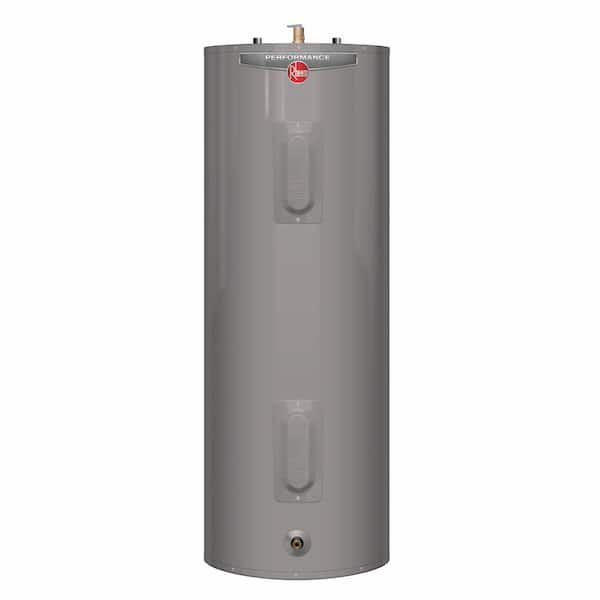
Credit: www.homedepot.com
Frequently Asked Questions
What Is An Electric Water Heater?
An electric water heater uses electricity to heat water. It is efficient and easy to install. Perfect for residential use.
How Does An Electric Water Heater Work?
Electric water heaters use heating elements inside the tank. These elements heat the water when activated. It’s simple and efficient.
Are Electric Water Heaters Energy Efficient?
Yes, electric water heaters are energy efficient. They convert most of the electricity into heat. They also have high energy ratings.
How Long Do Electric Water Heaters Last?
Electric water heaters typically last 10 to 15 years. Proper maintenance can extend their lifespan. Regular checks are recommended.
Conclusion
Choosing the right electric water heater can save you time and money. Consider your household needs and energy efficiency. An efficient model provides reliable hot water and reduces electricity bills. Investing in a quality heater ensures comfort and convenience for years to come.
Make a smart choice for your home today.

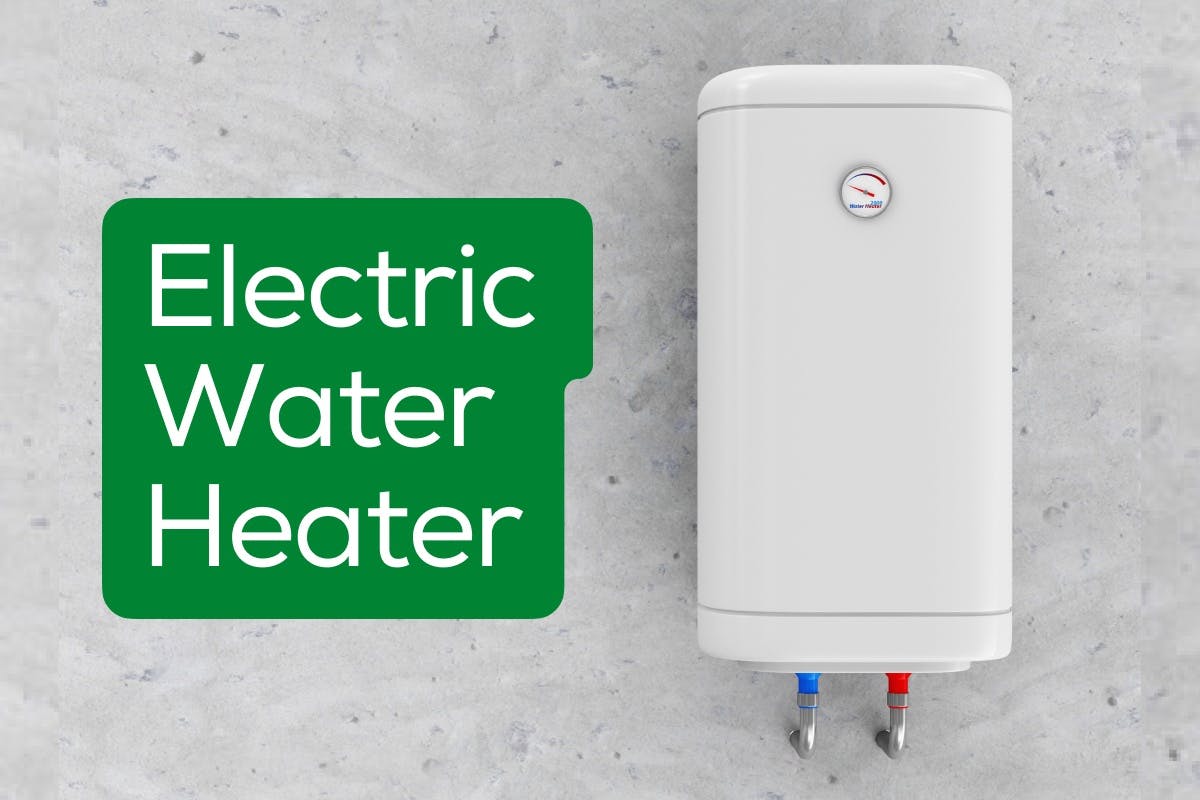
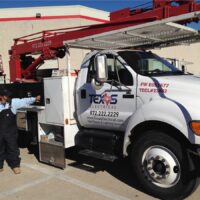
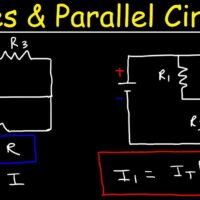
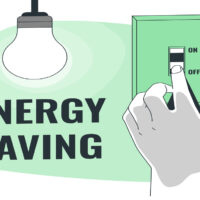
This post truly brightened my day! I appreciate how you delve into the topic with such positivity and clarity. It’s refreshing to see content that not only informs but also uplifts the reader. Your writing style is engaging and always leaves me feeling inspired. Keep up the fantastic work!